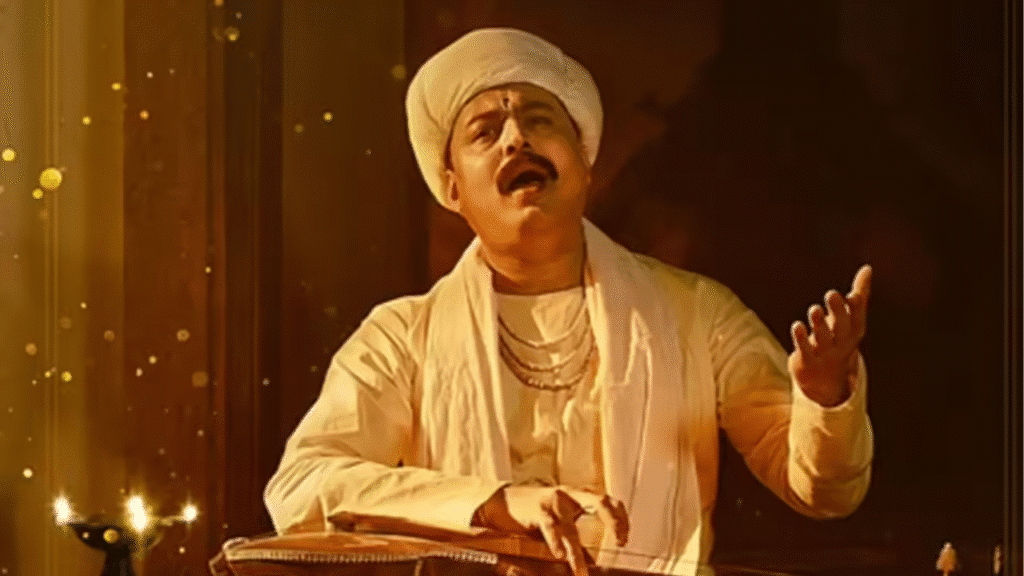Language: Marathi
Age Rating: U
Genre: Biographical Drama, Spiritual, Historical
In this Sant Tukaram movie review, we delve into the heart of Chandrakant Kulkarni’s cinematic vision that respectfully and brilliantly reimagines the life of one of Maharashtra’s greatest saints. Anchored by a powerful performance from Jitendra Joshi and supported by a deeply empathetic ensemble, this film breathes new life into the age-old story of Tukaram Bolhoba Ambile’s transformation into the revered poet-saint, Sant Tukaram.
Plot Summary
Set in the 17th-century Dehu village, the film follows the spiritual evolution of Tukaram, a humble and devout man who faced personal and societal adversities with grace and unwavering faith in Lord Vithal. The narrative gently unfolds his transformation from a grieving farmer and family man into a divine spiritual force whose abhangas (devotional poems) transcend time.
From his struggles with famine and family tragedies to the rising inner voice that turned into soulful wisdom, Sant Tukaram gives viewers a textured journey into the making of a saint whose philosophy remains relevant even today.
Performances
Jitendra Joshi as Tukaram
Jitendra Joshi delivers a career-defining performance that is subtle yet stirring. He brings an earthy authenticity to Tukaram, portraying him not as a mystic from above but as a relatable, flawed man guided by spiritual love and purpose. His expressions, silences, and the weight he brings to Tukaram’s words create an emotional resonance that stays with you long after the credits roll.
Supporting Cast Brilliance
- Veena Jaamkar (Rakhma) and Padmanabh Bind (Kanha) deserve special praise for embodying their roles with dignity and realism.
- Rukmini Sutar as Aavali balances assertiveness and devotion beautifully.
- Yatin Karyekar as Savaji, Tukaram’s elder brother, adds dramatic weight to the family conflicts and community dynamics.
Each actor, under Kulkarni’s direction, shines as part of a larger spiritual tapestry, ensuring the film remains ensemble-driven and emotionally inclusive.
Direction and Technical Craft
Director Chandrakant Kulkarni handles the sensitive material with a balance of reverence and cinematic flair. His vision is grounded, with no over-dramatization or mythification. Instead, we see Tukaram as a man shaped by loss, love, and faith.
- Background Score by Mangesh Dhakde enhances the narrative without overwhelming it. The music gently lifts the film’s emotional arc and provides a devotional atmosphere.
- Screenplay & Dialogues by Ajit Dalvi and Prashant Dalvi are the soul of this film. The use of simple, thoughtful language to convey deep philosophy is one of the movie’s most effective strengths.
- Cinematography captures rural Maharashtra with raw beauty, and the editing keeps the pacing tight across 150 minutes.
What Makes Sant Tukaram Stand Out
- Faithful to spiritual storytelling without excessive ornamentation.
- Outstanding performances from every member of the cast.
- A script that respects silence as much as spoken word.
- An evocative score that supports but never overshadows.
- A director who understands the fine line between cinematic and sacred.
Final Verdict: ⭐⭐⭐⭐⭐ (5/5)
Sant Tukaram (2012) is not just a biographical film; it is a cinematic pilgrimage. With its grounded storytelling, spiritual insight, and emotionally resonant performances, it stands as a timeless tribute to one of India’s most revered saints. Whether you’re spiritually inclined or simply a lover of sincere cinema, this film deserves your attention.
Latest Movie Reviews
- Tanvi: The Great Movie Review: A Soul-Stirring Journey of Dreams, Autism, and Belonging
- Nikita Roy Movie Review: A Powerful Thriller That Blends Logic, Emotion, and the Supernatural
- Lakshya Movie Review: A Heartwarming Tale of Hope and Grit in Rural Karnataka
- Soothravakyam Movie Review: A Stirring Malayalam Thriller With Heart and Social Grit
- Oh Bhama Ayyo Rama Movie Review: A Heartfelt, Imperfect Rom-Com That Charms and Falters
- Aankhon Ki Gustakhiyan Movie Review: A Beautifully Bold Debut Wrapped in Quiet Romance
- Janaki V vs State of Kerala Movie Review: A Gritty Yet Flawed Courtroom Drama With Powerful Intentions
